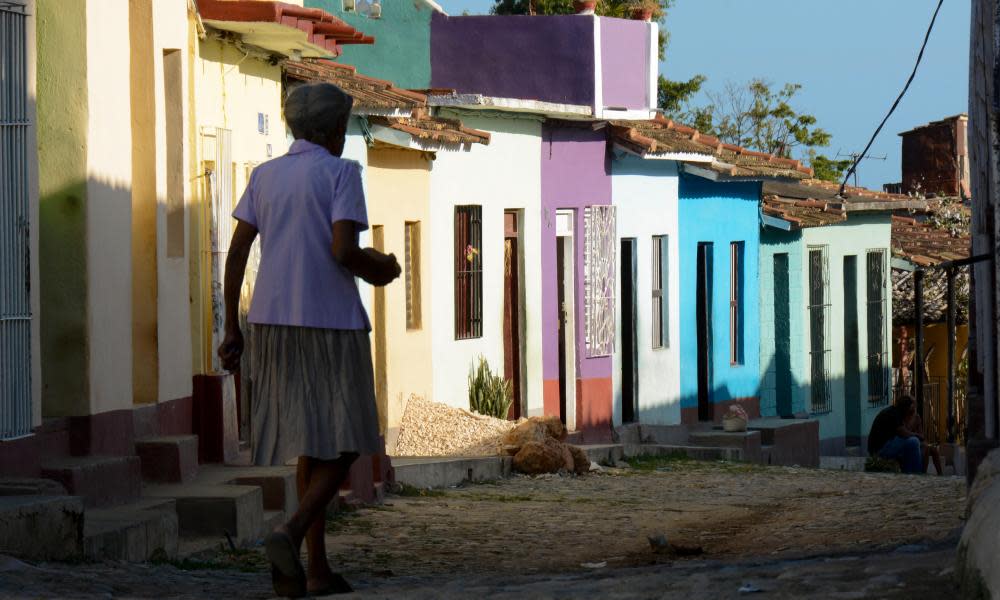Love After Love by Ingrid Persaud review – flashes of pure truth

Ingrid Persaud won both the 2017 Commonwealth short story prize and the 2018 BBC National short story award with “The Sweet Sop”, a story about a son who supplies chocolate to his estranged dying father. This novel is her highly anticipated follow-up: the story of Trinidadian Betty Ramdin, who has suffered for years at the hands of her husband, an abusive drunk who “only gave love you could feel. He cuff you down? Honeymoon. He give you a black eye? True love in your tail.” Widowhood is Betty’s respite. Following her husband’s death she takes in a lodger, Mr Chetan, a profoundly decent man who becomes Betty’s best friend as well as a father figure to her young son, Solo. They settle into a platonic partnership – cooking, gardening and raising Solo – creating a family as an antidote to their own unyielding loneliness.
Persaud has a knack for finding the sublime in the ordinary: in her hands the quotidian details of even apparently “small” lives lead to flashes of pure truth. The story is recounted through a series of tender, amusing vignettes, with Betty, Chetan and Solo taking turns at the narration. “You should see Mr Chetan and Solo,” Betty says early on, “happy as pappy and I’m like a Wednesday in the middle.” As with “The Sweet Sop”, the language is colloquial, with both narrative and dialogue soaked in an ear-catching Trinidadian dialect. The prose is playful and rhythmic, seeming to beat its own drum, so that at times you don’t read the novel so much as hear it. You sit in its company while it takes you into its confidence.
Persaud plays with time as well as language, sometimes flitting over years in one paragraph, sometimes lingering forensically on a single episode. This feels slightly dizzying to begin with, but serves to draw us into a deeper intimacy with the characters, as if we have indeed born witness to a large span of their lives. When one evening Betty and Chetan are overheard by Solo spilling their deepest secrets to each other over glasses of rum, we feel a deep cut of grief at the way the revelations shatter their slapdash little family, causing Solo to flee to New York, where they “think all brown and black people make one way – thief, murderer, rapist or terrorist”. There he is an illegal immigrant caught in a web of black-market fraudsters in his hunt for a fake social security number. Betty is left to grapple with a long, bitter estrangement from her son, even as she’s tormented by the after-effects of an abusive marriage.
Meanwhile, Chetan, driven by the realisation that “Miss B and I needed to be free to meet other people otherwise it was like we were in a sexless marriage”, becomes distracted by yearning for his first love Mani, with whom he reconnects via social media only to be envious of the contentment he’s found with his husband. It’s our unfolding awareness of the unyielding direction of Chetan’s desires – jolting him into “3am awakenings” and filling him with “fear, anticipation and horniness” – that sinks in deep. A raw, achingly sensual encounter with a stranger in a public toilet leaves him reeling, and the reader with him. “If things were different,” he says, “I would have thanked him for making me feel unbroken, unmarked.” This is one of the novel’s most moving scenes, striking a tonal balance that seems almost alchemical. In “The Sweet Sop” it was the balance of “anger and humour and love” that earned accolades from the National short story award judges. Here, Persaud achieves another impeccable calibration: the contentment of Chetan’s happy domestic life with Betty chafing against his acute loneliness as a gay man in a community where “simply being me is illegal, immoral and perverted”.
One of the reasons Love After Love is so delightful is that it reads like a modern meditation on the different kinds of love as catalogued by the ancient Greeks, crossed with the characters’ deliciously gossipy self-reflection. Persaud gives us a captivating interrogation of love in all its forms, how it heals and how it harms, the twists and torments of obsession (mania), sex and romance (eros), family (storge), friendship (philia), acceptance or rejection by the community, and so on. But much like the Derek Walcott poem from which it takes its title, the novel is ultimately concerned with the possibilities of that elated and oddly elegiac moment when we finally come to love ourselves.
• Sara Collins’s The Confessions of Frannie Langton is published by Penguin. Love After Love by Ingrid Persaud is published by Faber (RRP £14.99). To order a copy go to guardianbookshop.com.


